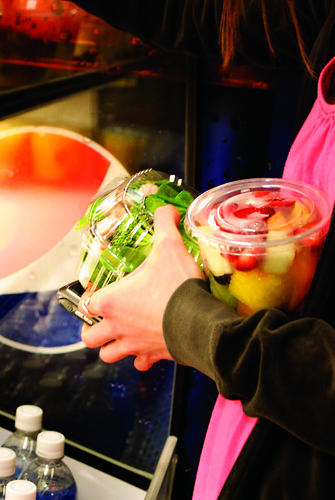Student Center food court employees report that thousands of dollars in food are stolen each semester.

Temple students found responsible for stealing food from the Valaida S. Walker Food Court in the Student Center could each face as much as $100 in fines.
Executive Director of Campus Safety Services Carl Bittenbender said the Student Center food court reports an average of 25 Temple students caught stealing food each semester.
“Half of these incidents consist of students who try to take food from the building, and the other half consists of students who eat food within the food court without paying for it,” Bittenbender said.
While Director of Operations Mindy Segal said there is no way to assign an exact number to account for all the money the food court has lost from food theft, she estimates it could be as much as $30,000 in an academic year.
“It has always been an issue, but in the past five semesters it has become much more prevalent,” Segal said.
Several measures have been taken to combat the number of students who commit food theft in the Student Center. The food court has installed security cameras and signs that tell students to keep their receipts. Security also monitors the food court to keep an eye out for theft.
“We even had to end up taking the trashcans out of the food court because people were eating food and just throwing it into the trashcan without paying for it,” Segal said.
Senior elementary and special education major Maria Sciarrone said the way the food court operates could be a contributing factor to the problem.
“I feel like if people paid before they got their food, stealing would be less likely to occur,” Sciarrone said.
Staff members keep track of every food item purchased, which is how employees discovered they were having problems with theft.
“We have a system where everything is tracked in a computer by item. It doesn’t just ring through as a price. We would take a look at what our inventory was, versus what we had purchased, and we would realize that we were not selling these items,” Segal said.
Once a student is suspected of stealing food, that student meets with a program coordinator in the Office of Student Conduct. Matters that are not resolved in that meeting are then brought before the Student Conduct Board.
Student Conduct Boards are made up of trained volunteers from across Main Campus. The boards range in size from three to five members and are composed of faculty, students and administrators.
Any student found responsible for food theft during a SCB hearing typically faces a semester-long period of probation, along with a $50 to $100 fine.
“The reasoning behind that fine is that if a student is found responsible or if they take responsibility for stealing, they financially hurt an area. The fine is used as a restitution for that,” Senior Associate Dean of Students Andrea Caporale Seiss said.
“I know we aren’t saving lives or doing heart surgery here, but this is something that is important to us. We leave our families every day to do this job because we enjoy what we do, and it really tarnishes what we are doing,” Segal said.
The Student Center food court serves 45,000 meals every week to roughly 7,000 students every day.
Sodexo, a subcontractor for Temple, operates the food court, along with 40 other campus food locations, including Starbucks and the Esposito Dining Center on the first floor of the Johnson and Hardwick residence halls.
Some students, such as sophomore psychology major Jordan Adler, said they feel the food in the food court is expensive.
“If I weren’t on a meal plan I probably wouldn’t eat in the food court,” Adler said, attributing this to the food pricing.
Several factors, including the annual increase in the cost of living, cause Sodexo locations on campus to increase prices every year. These increases can vary from 1.5 percent to 5 percent.
The cost of meals in the food court was raised from $6.80 to $6.95 last year.
“It is not an increase across the board. It goes by item, and the university has to approve each one,” Segal said.
While there is no direct correlation between the increase in prices and the amount of money the food court loses due to theft, Segal said theft is one of the many variables considered.
“There is a lot of thought put into where the prices are generated,” she said. “And when you are looking at a broad spectrum, that is within the spectrum, but it is not the deciding factor.”
Karen Blyton can be reached at karen.blyton@temple.edu.



Be the first to comment